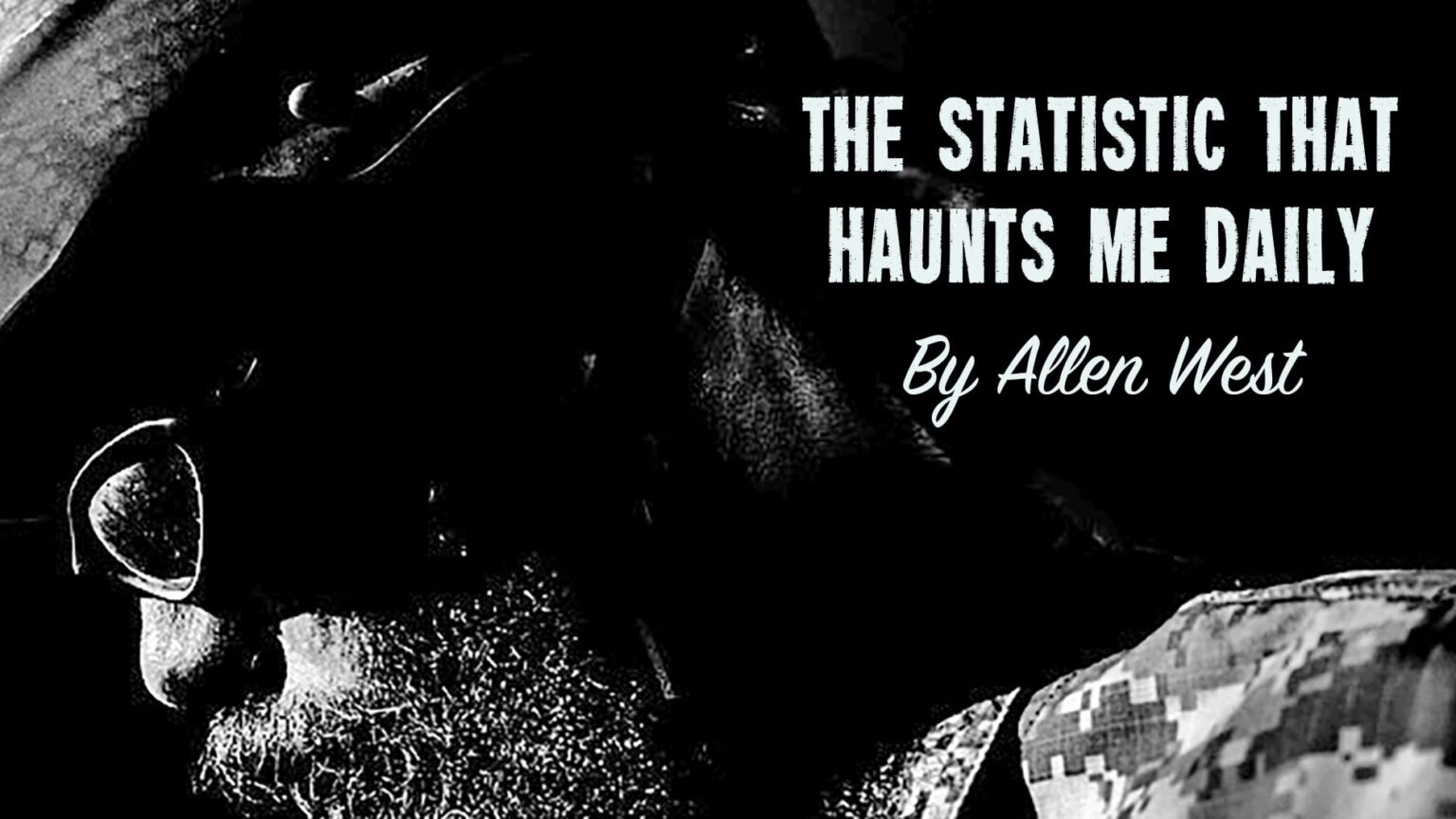 By Allen West –
By Allen West –
Just before Christmas, the Black Knights of the Hudson, the Army Cadets, took on the University of Houston in Ft. Worth in the Armed Forces Bowl and crushed them. The Cadets had an incredible 11-win season which is a very impressive statistic.
There is also another statistic that relates to our men and women who serve in uniform that is not impressive . . . it is disturbing. On my salute hand, trigger finger, I wear a simple black metallic band. It is called the #22Kill ring. Sadly, this ring represents the 20-22 of our honored veterans across our America, who, daily, on average, take their own lives. Each day that I look down on my hand, I am reminded of this statistic, and pray for the day when I can remove it.
We just finished a very special season, Christmas, when people sing songs such as Have Yourself a Merry Little Christmas. However, for many, it was not a merry time, but a time of solitude, anxiety, and despair. I was sent this story from my dear friend, former US Marine Corps Recon Special Operator and former MMA champion, Chad Robichaux. Chad faced the same struggles and issues, but by the grace of God, for whom this season is about, Chad overcame. Chad and his lovely wife created an organization called the Mighty Oaks Foundation for whom I spoke at their 8th Annual Gala.
Chad was torn apart and just heartbroken about the story that I will share with you all. As reported by TampaBay.com.
“On Dec. 10, retired Marine Col. Jim Turner put on his dress uniform and medals and drove to the Bay Pines Department of Veterans Affairs complex. He got out of his truck, sat down on top of his military records and took his own life with a rifle. Aside from leaving behind grieving family and friends, Turner, 55, of Belleair Bluffs, left behind a suicide note that blasted the VA for what he said was its failure to help him. I bet if you look at the 22 suicides a day you will see VA screwed up in 90%,” wrote Turner, who was well-known and well-respected in military circles.
I did 20+ years, had PTSd and still had to pay over $1,000 a month health care. Turner’s death marked the fifth time since 2013 that a veteran has taken his life at Bay Pines. There were more suicides there during those five years than at the rest of the VA hospitals in the state combined. There were none at the James A. Haley VA Medical Center in Tampa. It’s unclear how many other veterans killed themselves during that period at VA facilities around the nation.
The government’s second-largest bureaucracy declined a federal Freedom of Information Act request by the Tampa Bay Times for that information last year. In an email Friday afternoon, VA spokeswoman Susan Carter said the agency only started collecting the information a month after the denial.
From October to November 2018, there have been 19 suicide deaths at VA facilities around the United States, Carter said. The vast majority of veteran suicides are off campus and 70 percent of those who take their lives hadn’t sought treatment from the VA, according to VA statistics.
As for why it keeps happening at Bay Pines, officials there say they don’t have an answer.
Veterans are the men and women who were willing to write a blank check to the rest of America for their freedom. That blank check they wrote was backed with precious collateral, with their lives. As the saying goes, & all gave some, some gave all. It remains a black eye on our nation, just like the black ring I wear, to have even one veteran in America feeling so despondent, dejected, and depressed, that they take their own lives. Here are men and women who have survived the hardships and arduous nature of combat deployments. We tell them thank you for your service, but as a nation, are we truly reflecting that sentiment? I am on the Advisory Board of the Salvation Army here in Dallas, and it pains me to know of veterans who are homeless. Dang, even the military once gave them a tent and a sleeping bag.
How did we get to this point?
Long before he became a statistic — one of 20 veterans who die by suicide every day — James Flynn Turner IV was a young man from a wealthy Baltimore family who joined the Marine Corps and reveled in his service to the nation. “My brother’s identity was being a Marine,” said Jon Turner. Jim Turner flew F-18s and then became an infantry officer, taking part in the invasion of Iraq in 2003. He later served in Afghanistan and spent a decade working at U.S. Central Command at MacDill Air Force Base. He left “an enduring legacy of professionalism, commitment and superior leadership which served as a guiding force for all service members whose lives he touched,” said Edward Dorman III, a recently retired Army major general who worked with Turner at Central Command for a decade.
“That’s a life worth emulating.”
When Turner retired, he lost his identity and began to struggle, his younger brother said. Colonel Jim Turner was just two years younger than I am. I, too, served in Iraq in 2003. What so many of our veterans struggle with is the transition. They must learn that the position they attained does not correspond to their purpose in life, and they must never forget that their life has a purpose. This epidemic is not about enlisted versus officer. This epidemic is not about socioeconomic status. This epidemic is about the warrior’s soul, their spirit, and the fact that there is a darkness that overtakes it.
That is why Chad Robichaux and the Mighty Oaks Foundation has been so successful. In their eight-year existence, their program has not lost a warrior, and, as stated, it started with the founder, Chad, himself. Their focus is on the spirit, filling that hole with God’s love.
Sometimes, there is only one cure for a broken and aching heart: spirit. Col. Turner’s story continues: Jennifer Turner believes her ex-husband may have taken his life because he was refused treatment at Bay Pines. Both she and Jon Turner say it was quite possible he became frustrated with having to wait and left without being helped. The VA did not comment, citing privacy concerns. Others who lost a loved one to suicide at Bay Pines have different theories on why they chose to end their lives there.
Vietnam War Navy veteran Jerry Reid, 67, may have driven to the VA to take his own life on Feb. 7, 2013 (my 52d birthday), because he lived alone and didn’t want to have his body found weeks or months later, said his friend, Bob Marcus.
Joseph Jorden, 57, a medically retired Army Green Beret, likely took his life at Bay Pines on March 17, 2017, not because of poor treatment, but because he felt safe there, said his brother, Mark Jorden.
But Gerhard Reitmann, 66, who served with the Marines in Vietnam and later as a guard for President Richard Nixon at Camp David, “felt like the VA wasn’t really taking care of him” when he ended his life at Bay Pines on Aug. 25, 2015, said his brother, Stephan Reitmann.
The mother of Esteban Rosario, 24, who ended his life at Bay Pines on May 8, 2013, could not be reached for comment.
Please, everyone, in 2019, find a veteran that may not have any family. Someone who was willing to make the last full measure of devotion for you, and devote just one day to them. You may never know what that simple act of kindness could mean. Maybe go by the VA Hospital near you and bring some good cheer to a veteran. Give a special gift that does not cost anything, but means so very much. Why? Because it is the way to say, thank you for your service.
If you know of a veteran struggling, in need for spiritual renewal, please contact Chad Robichaux and the Mighty Oaks Foundation.






